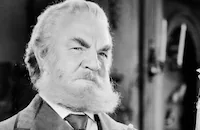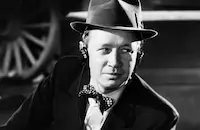Ladies in Distress
Cast & Crew
Gus Meins
Alison Skipworth
Polly Moran
Robert Livingston
Virginia Grey
Max Terhune
Film Details
Technical Specs

Synopsis
Josephine Bonney, the mayor of Bonneyville and a former schoolteacher, is besieged by town citizens demanding action when a gang of ruthless racketeers establishes a "Merchants' Protective Association" and roughs up any who do not join. The drive to recall Jo is led by attorney Fred Morgan, a would-be candidate for her job, who is actually the boss of the racketeers, assisted by businessman Daniel J. Roman. Jo assures her constituents that she is sending for a man who can control the situation, after which she secretly hires Pete Braddock, a former pupil who has retained affectionate feelings for her in spite of his own decline into gangsterism. Despite her sister Lydia's distrust of Pete, Jo is certain that he can go straight and clean up the town from which he ran away fifteen years ago. Jo introduces Pete to police chief Dave Evans as John Wilson, a special investigator from Chicago. Jo insists that Pete stay at her house, and he quickly becomes enamoured of her lovely niece Sally, who knows his true identity as the town's former bad boy. The night of his arrival, Pete and Sally visit one of the gambling joints run by the racketeers, and Pete captures the two thugs sent to kill him after he wins big at the tables. The next day, the thugs give Pete the addresses of the town's other gambling establishments, and soon Pete has smashed the gambling ring. Jo holds another town meeting and introduces Pete as John Wilson, and the town cheers him. Pete then visits Roman, whom he warns to get out of town. While they are talking, Morgan enters the office and, before he sees Pete, reveals that he is head of the gang. Pete tells Morgan that he also must leave town, but quickly changes his tune when Morgan and Roman offer him a large bribe. Pete agrees to accept $25,000 over a four-week period in exchange for his silence, and he aids them in making their protective society legitimate by publishing a magazine in which merchants are forced to advertise. Two weeks pass as Pete and the racketeers rake in money, until Jo collapses on her birthday, which Pete had forgotten for the first time in fifteen years. Pete is grief-stricken over Jo's illness, and her and Sally's absolute faith in him prompts him to inform Roman and Morgan that the deal is off. Roman laughingly tells Pete that he is in too deep, and threatens to tell Jo about the bribes if he does not leave town. Ashamed and discouraged, Pete leaves town, and Morgan demands Jo's recall. At a town meeting, Jo wearily tells the citizens that she will offer no defense and is about to resign, when a bloodied Pete arrives, bearing a beaten Roman and the ledgers that will convict the racketeers. Pete reveals Morgan's leadership of the gang, and the crowd cheers Pete and Jo. After Lydia agrees to marry Dave, and Sally embraces Pete, Jo cheerfully admits that she had no idea Pete was temporarily in with the gang.

Director
Gus Meins
Cast

Alison Skipworth

Polly Moran
Robert Livingston

Virginia Grey
Max Terhune

Berton Churchill
Leonard Penn
Horace Macmahon
Allen Vincent

Eddie Acuff
Anthony Hughes
Jack Carr

Walter Sande
Billy Wayne
Crew
Alberto Colombo
Phil Ford
Harry Grey
Gordon Kahn
John Victor Mackay
Jack Marta
Dorrell Mcgowan
Stuart Mcgowan
Ernest Nims
Irene Saltern
Doré Schary
Murray Seldeen
Al Wilson

Film Details
Technical Specs

Articles
Virginia Grey (1917-2004)
She was was born in Los Angeles on March 22, 1917, and was exposed to the film industry at a very young age. Her father, Ray Grey, was a Keystone Cop and acted in several other of Mack Sennett's comedies with the likes of Mabel Normand, Dorothy Gish and Ben Turpin. When her father died when she was still a child, Virginia's mother encouraged her to join the acting game and audition for the role of Eva for Uncle Tom's Cabin, a big budget picture for Universal Studios in the day. She won the role, and acted in a few more pictures at the studio: The Michigan Kid and Heart to Heart (both 1928), before she decided to temporarily leave acting to finish her schooling.
She returned to films after graduating from high school, and after bouncing around Hollywood doing bits for various studios, she hooked up with MGM in 1938. Her roles in her first few films were fairly non-descript: In Test Pilot and Ladies in Distress (both 1938), she did little more than look pretty, but in the following year she had scene-stealing parts in The Women (upstaging Joan Crawford in a delicious scene as a wisecracking perfume counter girl) and as the suffering heroine in Another Thin Man (both 1939).
Despite her versatility (she could handle comedy or drama with equal effectiveness), MGM would cast her in some above-average, but hardly starmaking movies: Whistling in the Dark, The Big Store (both 1941), and Tarzan's New York Adventure (1942). She left MGM in 1943 and became a freelance actress for several studios, but her material as a leading lady throughout the '40s were mediocre: Swamp Fire, House of Horrors (both 1946), and Mexican Hayride (1948) were sadly the more interesting films in her post-MGM period. But by the '50s she was a well-established character actress, appearing in fairly big-budget pictures: All That Heaven Allows, The Rose Tattoo (both 1955), Jeanne Eagels (1957).
In the '60s, Grey turned to television and found work on a variety of hit shows: Wagon Train, Peter Gunn, Bonanza, My Three Sons, I Spy, and several others; plus she also captured a a couple of notable supporting parts in these films: Madame X (1966), and Airport (1970), before retiring completely from acting in the early '70s. She is survived by her sister, Lorraine Grey Heindorf, two nieces and two nephews.
by Michael T. Toole

Virginia Grey (1917-2004)
Quotes
Trivia
Notes
The working title of this film was First Prize. According to Hollywood Reporter news items, Bradford Ropes, Sam Fuller, Eric Taylor, Jack Townley, Guy Endore and Jane Bartlett were signed at various times to work on the screenplay. Their contribution to the final film, however, has not been confirmed. Hollywood Reporter also noted that Colbert Clark was originally set to produce, but left Republic before filming began, and that Jim Gayle and the team of Oscar and Elmer were to appear in the film. Their participation in the completed picture has not been confirmed. According to modern sources, Nathanael West wrote a treatment for this film that was rewritten by Darrell and Stuart McGowan.














